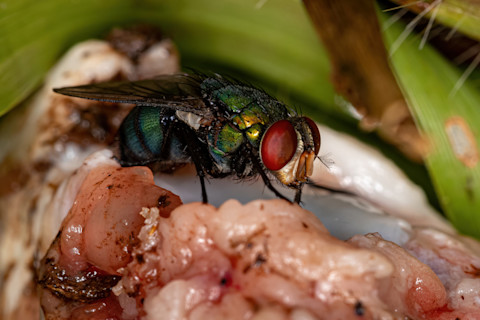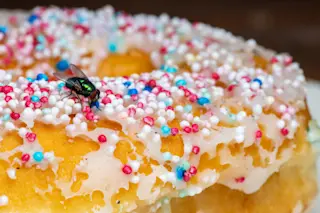How is it that a fly always seems to be buzzing around your food moments after you sit down for an outdoor meal?
The answer is practice. Or, more specifically: evolution. Flies and other insects have been on a multimillion-year journey of evolution, honing their ability to detect food. Being able to zero in on nutritious meals is a matter of life and death.
The family of flies that I study – the blow flies – are the buzzing ones that are usually a beautiful metallic blue, with bronze and green colors. They’ve perfected their ability to quickly sense the smells that naturally come off picnics and trash cans because they are a source of food for their offspring, also known as maggots.
There is a lot of competition for a resource like an overflowing dumpster because of how nutritious garbage, and the meat that is rotting in it, is. But the blow flies can sense these odors long before their competitors or people can, and tend to show up to the scene first.

(Credit: ViniSouza128/iStock via Getty Images) Flies’ antennae help them track down food from far distances.
ViniSouza128/iStock via Getty Images
How do flies know where to go?
Sensing systems differ depending on the insect and species. The blow flies’ main sensing organ is their antennae, two thin projections from the head that are covered in tiny hairs. These fine hairs are made up of special cells that contain receptors for specific odors.
Think about a batch of chocolate chip cookies fresh from the oven. You can detect their delicious scent because we humans have receptors on the surfaces of the cells that line the inside of our noses. These receptors send signals to the brain: yummy food ahead. They’re detecting the sweet smell of sugar-based molecules, an energy-rich food source for us.
What’s a “good” or a “bad” odor can differ depending on the animal doing the smelling. The enticing rotting meat stench that a fly finds delightful is perceived quite differently by a person passing by a stinking dumpster on a hot day.
But any fly that can detect the useful odor signal, which means “nutritious fly food here,” will have an advantage. Over time, the insects that have the receptors for those scents will have better survival rates and produce more offspring.
Not all smells are good, though, and being able to smell something bad can also protect whoever is sniffing it – whether that’s you or an insect. Think of the skunk spray warning smell. It won’t necessarily harm you, but it lets you know to avoid its source.

(Credit: Boris SV/Moment via Getty Images) Flies can sense odors long before humans and their competitors can.
Boris SV/Moment via Getty Images
Providing for offspring
For more than 15 years, I’ve traveled to different parts of the world, where I expose rotten meat and wait for flies to appear. My research is related to understanding how an environment influences a fly’s ability to search for and find its food source, its sole purpose of living. For example, flies rely on wind to carry scents across varying environments.
Warmer temperatures promote fly activity because they’re poikilothermic – meaning cold-blooded – and need heat to warm up their muscles for flight. Flies use visual cues to fly through the air and to avoid obstacles, so they’re more active during the daytime.
Blow flies can travel up to 28 miles for food. Most of the time when I expose a stinky rotten meat bait, a large group of flies will come right away. But other times I’m surprised when no flies come to enjoy the gross buffet I’ve prepared.
When a female fly smells something that might be a good food source for her babies, she lands on it and assesses whether there’s enough to support her 400 or so eggs. A mom fly’s ability to smell out a good nursery for her offspring is the key to the survival of the species and ultimately why this sense is so strong.
Male flies are less interested in these smells as a sign of food. But since they can signal where to find female flies for mating, males will still respond to the scent of a steaming dumpster.
Flies have evolved to be superior garbage-smellers because this superpower helps them survive. The reason they manage to find dumpsters wherever they exist is the same reason they’ll show up to your picnic to check what’s on the menu – they’re sniffing for sustenance that will help them create the next generation of flies.
Christine Picard is an Associate Professor of Biology at Indiana University. This article is republished from The Conversation under a Creative Commons license. Read the original article.














